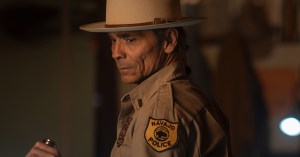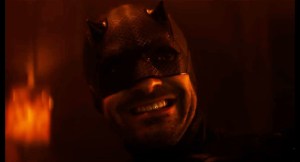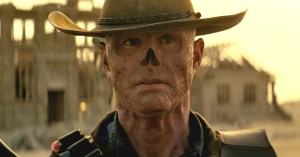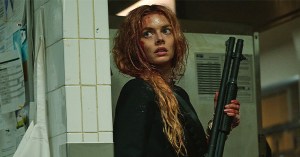RT-UK: Lorenzo di Bonaventura talks Transformers and Stardust
The uber-producer talks to RT-UK.
 If there’s a job going behind-the-scenes in the movie business, Lorenzo di Bonaventura has been there, done that, having served time in distribution and marketing at Columbia Pictures as an executive at Warner Brothers. It was in his time at Warner that he gave green-lights to the likes of The Matrix, Harry Potter and the Philosopher’s Stone and Ocean’s Eleven, and was famous for championing projects many would have overlooked.
If there’s a job going behind-the-scenes in the movie business, Lorenzo di Bonaventura has been there, done that, having served time in distribution and marketing at Columbia Pictures as an executive at Warner Brothers. It was in his time at Warner that he gave green-lights to the likes of The Matrix, Harry Potter and the Philosopher’s Stone and Ocean’s Eleven, and was famous for championing projects many would have overlooked.
But most wouldn’t have expected him to switch from executive to producer, as he did in 2003, where he found himself answering to people whose job he’d been doing years previously. In Hollywood, director Kevin Smith once noted, it’s customary to fail upwards. Di Bonaventura has seemed to succeed downwards; set up with a base at Paramount, he’s brought Four Brothers, Constantine and Doom to screen and has his name on the posters of Paramount’s two summer tent-poles, Stardust, which opens later this year, and the movie RT-UK has come to talk to him about today, Transformers.
 RT-UK: Many in Hollywood would consider it a step down, almost, to go from studio exec to producer – what made you want to take that route?
RT-UK: Many in Hollywood would consider it a step down, almost, to go from studio exec to producer – what made you want to take that route?
Lorenzo di Bonaventura: Well, I think every executive wants to spend more time on the creative side and the greater frustration of being an executive is that you spend way too many hours on details that have nothing to do with the creative process. So I think that all the really good executives pine a little bit to get on the other side. But it’s daunting to go and do a different job and I would say it took me a good two or three years to really own being a producer.
RT-UK: I guess doing the executive job gives you all of the tools that you need to be a producer.
LdB: It gives you some of them. There are definitely skill sets that have some compatibility and it helps very much to have been a studio executive and to understand the studio process. When you’re talking to executives you can go, “Look I understand. Here’s what you’re feeling.” Because the thing that people don’t appreciate is that, when you’re a studio executive and you say yes to something, your career is immediately in that other person’s hands. And that’s not easy to do for people, in any business and in any walk of life. You know, you’re suddenly going, “OK, well, let’s say yes to The Matrix.” And then you immediately think, “What is this crazy thing that I just said yes to?” [laughs] You know, I love those guys and I’ve known them forever and that’s probably in some ways a bad one, but in town it was regarded as a really odd decision on my part. So you get a lot of negative feedback from people who cared about you. Like, “You’re going to lose your career, Lorenzo.” When people start telling you that you do realise you’re in their hands.
It’s an illusion that people think that’s studio executives have a great deal of control over the process day to day; they don’t have the time they don’t have the skills necessarily. It’s not their job.
RT-UK: It’s funny you mention The Matrix, even after the trailer I remember being dragged along to see some weird Keanu Reeves movie I wanted nothing to do with, and at that time it must have been on your shoulders for quite a while. But at the same time, it often seems to be the case that the most controversial, contrary productions end up bearing the most fruit, becoming classics.
LdB: I think there’s a lot of truth to that. If I looked back at the movies I’ve made, as both an executive and a producer – and I haven’t done as many as a producer, obviously – the ones you had to give the most blood on, and that’s the way I describe those projects as you have to give a lot of plasma to get ’em going, are the ones that you end up being defined by. Because they are more singular, they are more interesting, and they are also the ones that destroy careers if you don’t get ’em right.
RT-UK: Do you find it more exciting to be at the production level?
LdB: Yeah, I mean look, it’s really fun, but both jobs require a lot of hard work if you’re going to do them well. What is very different about being a producer is that you get that day-to-day involvement that you can’t get as an executive, and that is food for the soul. It can be very exciting and you can make more contributions. Each movie has a different characteristic, I’m finding as a producer. So, what you do as a producer, I’m finding, is that you’re sort-of a jack-of-all-trades, master-of-none, and each movie requires different skill sets from you, which keeps it interesting.
RT-UK: Not only does it seem like a brave choice to make the decision to switch, but you’ve made it nice and difficult on yourself; Constantine was your first credit as a producer I believe? That’s a big movie…
LdB: Well you know, being an executive and having worked on so many films you learn a lot about it as an executive. Your skill set is not entirely transferable, but a lot of it is. And certainly, having been a Warner Bros executive, you work on a lot of big movies, so you’re not daunted by that prospect. There’s a lot more to do on big films – and I’m not saying small films are any easier, by the way, in some respects they’re harder – but the quantity of decision making on a big film is just staggering. The more you’ve been into the big films the more you can apply the lessons learned and as soon as you think, “OK got that one down,” then there’s a new permutation and you think, “OK, I’ve got to evolve my thinking forward!” A movie like Transformers,there’s an infinite amount of thinking and a lot of work to be done.
RT-UK: There’s also a huge weight of expectation from audiences as well, particularly with something like Transformers.
LdB: There’s a lot, and they’re very passionate about it which is fantastic. You know what, I like that challenge. I like the challenge of taking something that’s loved and trying to render it, whether it’s Harry Potter, Constantine, Transformers or anything else. And you can never please everybody, you can’t, and if you try you’ll probably fail really terribly.
Watching Michael [Bay] work on this movie was really interesting; particularly watching up-close as a producer, the amount of feedback – unasked-for feedback – was so significant that a lesser director could’ve gotten easily thrown off their game. If you start listening to all the feedback too early, you’re in trouble. It’s a question of when to use the feedback. So I think Michael used it very well; he evolved his thinking forward enough that he felt on very strong ground. Then he could hear the feedback and decide which ones legitimately challenged his point of view and which ones he felt he could not listen to. What’s been very gratifying is that the fans of Transformers seem to be coming out of this movie pretty happy. Usually, if they have a complaint they preface it by saying, “We’re being nitpicky here but…” Frankly, I love that. I do love that and it’s fun to have that conversation with people.
LdB: Yeah, they are. They’re very similar in a couple of respects, as they have a very strong point of view and really good taste. You know, Matthew has a very different personality than Michael, and going back to your earlier question about being a producer, it’s fun to work with different personalities. Creatively you get to learn something from each guy and if you’re lucky impart something back.
In Matthew’s case, going to such a big movie after Layer Cake – he would have to answer the question not me, but – I know that he leaned on me in certain areas. I’ve been there before making movies this big so I could say, “Yeah, this is a typical experience,” and he can make his own decision about what he wants from that. He’s not a man who’s shy about taking his own opinion but he had a resource, in a way, which had seen this and had worked in the studio on that kind of level. It’s experience; you don’t have to be particularly start but if you have experience you can repeat it.
RT-UK: Stardust is fantastic, I’ve seen it twice–
LdB: Really? Have you seen it with the full score?
RT-UK: No, it still had the temp score.
LdB: It’s definitely a lot different, Ilan did a great job on the score…
RT-UK: Awesome. But is there more pressure on Stardust because its fan base isn’t as large as Transformers‘?
LdB: Sure, if you look at the fan base of Transformers, you’ve got a lot of people who are gonna show up if you do it right. As passionate as the Neil Gaiman fans are – and they’re every bit as passionate as Transformers fans – they are much smaller group of people. And Neil’s sort-of bent view of the world – which I love – is definitely something that’s not easy to communicate. It can frighten people, it can draw people in because it’s fresh and new.
RT-UK: You mentioned producing is more creative than being an executive; to a certain extent is it about empowering guys like Michael and Matthew to let their own creativity run unchallenged?
LdB: I think that’s your job as a producer; to let the actors and the director make sure that they have the best version of it and the best version of it includes the script and there are certain things that you can have a creative contribution on. A guy like Michael, you’re not going to tell him what angle to shoot at. People have asked me, “When you’re on the set do you comment?” I’m like, “Are you Kidding?! He’s better than probably anybody else in Hollywood, what am I gonna say? ‘Oh I think you oughta take another lens?'” I mean, come on, it’s silly! [laughs] But, you know, I can be helpful in the script stage of it, I can help with the casting stage, the musical stage; with each guy you bring a different skill set to the table. But first and foremost, your job as a producer is to be somewhat anonymous.
I think I’m about to start my 145th film that I’ve worked on in some capacity as an executive or as a producer. So you see patterns when you’ve worked on that many. So you can say to somebody, “Hey, I’ve seen this pattern, there’s a brick wall coming right over there,” and they can choose to say, “OK,” or run right into it; it’s their choice. Sometimes you have to run into them to understand how to get around them.
RT-UK: Transformers is such a big movie but it was refreshing to see that there were real, human characters in the film. In a lot of ways it reminded me of the blockbusters of the eighties; recently we’ve left characters behind in Hollywood effects movies…
LdB: We didn’t really look at any specific time period of film, what we really looked at was the fact that, we felt that the mythology of the Transformers was so well established, we needed a human story. So really we spent a disproportionate amount of time on the human story because we felt like, for the non Transformer fan you better have good human character so they can connect to the movie.
And Spielberg came up with this idea of a boy in his car; his first car. It seems like a really simple idea, but it has amazing resonance and it carries all the way through the movie. So Michael responded to that idea when he heard it and all of us did. I don’t like these big films when they take themselves too seriously, unless it’s about something really serious. Let’s just have some fun. So the human story line, even in Transformers, since you’ve seen the film, there’s a lot of humour with that too.
RT-UK: I think it’s sold in Shia LaBeouf’s performance, too, and from Charlie Cox in Stardust.
LdB: I think in any movie you’ve got to have a rooting interest in somebody or some couple.
RT-UK: I guess the worry is otherwise it starts to look like two computers having a fight.
LdB: Yeah, I know. Listen, the hardcore fans were at first very outraged that there were any human characters in it. And it’s sort of like, well look it, you know you actually couldn’t afford that version of the movie by the way. Which is something that we actually said, the movie’s going to cost something like $350-500 million, I mean who knows? It’s really expensive to render these really big 32ft men. But at the end of the day, we’re human and we’re going to relate to a human character. An easier way to sort-of look at these big characters is through a human eye. Unless you’re somebody who grew up with it, in which case its very easy to make that transition.






